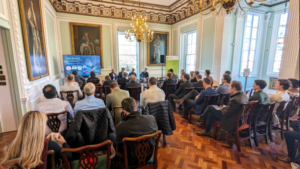5 reasons why local government needs open source
It doesn’t take a genius to work out that local government is a sector under serious strain. In his latest budget statement Osborne outlined that his proposals would cost £34bn – £17bn of which was to come from the public sector. Whilst local governments have made great strides during the age of austerity, developing innovative and enterprising ways to deliver public services, there is still much work to be done.
Technology is only one part of the delivery jigsaw puzzle, but it has a big role to play in helping to create modern local government. Open source in particular has a lot to offer. As a technology it’s always skirted around the periphery, but I’ve got a feeling that is about to change.
Here’s why:
- In England alone there are over 200 local government authorities. Despite each and every single one delivering almost identical services, from house and education to refuse, and each tackling some of the biggest transformation challenges ever seen, each and every single organisation has a different set up. If it’s not collaborating and able to work effectively together, how can local government possibly hope to tackle challenges such as bed blocking? Align resources for the Social Care Act? Or even at a more fundamental level create a culture of self-service within their organisation? The simple answer is that it can’t – something’s going to have to give.
- By its very nature, open sources fosters creative and original thinking – exactly what is needed during deep budget cuts. Plus it brings with it the potential for cost savings not just through collaborative working, but by ensuring other departments or councils who are working on a similar project can utilise the market/vendor research and even some of the tech platforms. The direct.gov website is the perfect example of this. Built on an open source architecture using open standards, the research, knowledge, processes and frameworks that went into creating the site are now available to all departments. There is no need to reinvent the wheel, which has the further benefit of rapid deployment times.
- Open source encourages not only the dissemination of best practice by just as importantly knowledge around best practices. This is essential as many councils or NHS Trusts have traditionally outsourced these skills to third parties. As a result they’ve lost valuable skills from their in-house teams as well as lost control over how their money is being spent. This is a scenario that from a basics economics and survival perspective simply can’t continue; they need in-house expertise to make their visions a reality.
- A lot of councils suffer because their IT systems are limiting them and the issue is they find themselves unable to break free of their tech shackles because the aforementioned third party has locked them into a proprietary system. Open source promotes an ecosystem where the focus is on the service. If you’re not happy, you can take your data elsewhere with ease.
- Simply getting by isn’t sustainable and doesn’t guarantee quality of citizen services. If the last five years have taught local government organisations anything, it is that an agile and collaborative approach to technology, working in tandem with other organisations that have the same goals, is the future.
To remain fit for purpose in the face of a multitude of challenges, local government needs nonconformist and unconventional thinking. It’s time to embrace open source and unleash its potential.
Article first appeared on Computer Business Review
Latest content
-

From ScanApp to Lego demos — What you need to know about Security & Policing 2025
Published on: 1 April, 2025 -

Truth, trust and transformation — 4 key takeaways from Zaizi’s AI in government event
Published on: 14 March, 2025 -

Zaizi talent shines at Computing DevOps Excellence Awards 2025
Published on: 13 March, 2025 -

Advancing DevOps practices with AI —lessons from AWS re:Invent
Published on: 10 March, 2025
